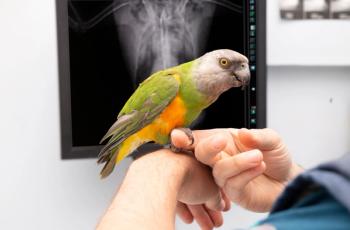
Gene Therapy Improves Muscular Dystrophy in Dogs
Results of a canine study may shine a light on the use of gene therapy in humans with muscular dystrophy.
Duchenne muscular dystrophy (DMD) is a debilitating, life-limiting genetic disease that affects about 1 in 5000 boys. Characterized by progressive muscle wasting, DMD is caused by a mutated dystrophin gene. This gene codes for dystrophin, a cytoskeleton protein responsible for proper stabilization and function of skeletal and cardiac muscle.
Gene therapy is a promising DMD therapeutic approach. In general, gene therapy uses a vector to carry a therapeutic gene and a promoter to control the gene’s expression after gene transfer. For DMD gene therapy, the vector and promoter are specific to skeletal and cardiac muscle cells. The vector—recombinant adeno-associated virus (rAAV)—carries microdystrophin, a shortened yet functional version of dystrophin. Dystrophin itself is too large to fit within a viral vector.
Previous studies have suggested the value of a golden retriever muscular dystrophy (GRMD) model for gene therapy testing. However, these studies often used immunosuppressive treatment regimens and did not evaluate functional benefit.
RELATED:
- Long-Term Efficacy of Gene Therapy for Diabetes Mellitus
- Systemic Gene Therapy Effectively Improves Canine X-Linked Myotubular Myopathy
In the first study of its kind, a research team demonstrated the long-term safety and efficacy of gene therapy in dogs with naturally occurring DMD, without immunosuppression. The team believes the findings, reported in
Treatment and Analysis
Researchers conducted a 2-part study, treating 12 male GRMD dogs at the Boisbonne Center for Gene Therapy in France. Untreated dogs with GRMD and healthy golden retrievers were used as controls. Following treatment, the researchers conducted a series of analyses to examine the gene therapy’s safety and efficacy.
Part 1
Four dogs received a single locoregional (LR) infusion of microdystrophin in 1 forelimb at 3.5 to 4 months of age and were euthanized 3 months posttreatment. The treated forelimb, but not other major organs, had high expression levels of canine microdystrophin (cMD1), suggesting restored dystrophin production levels.
On histopathology, treated forelimbs showed reduced myofiber regeneration and fibrosis. Interestingly, researchers found an association between increased percentage of cMD1-positive muscle fibers and reduced dystrophy.
Nuclear magnetic resonance imaging and spectroscopy findings also indicated improvement. For example, nuclear magnetic resonance imaging of treated forelimbs demonstrated reduced inflammation and necrosis. Spectroscopy revealed improved stability of the skeletal muscle cell membranes.
To assess functional benefit, the researchers measured the maximal wrist extension strength at selected time points posttreatment. Microdystrophin treatment significantly improved muscle strength.
Part 2
Eight dogs received either a single low- or high-dose systemic intravenous infusion of microdystrophin at 2 to 2.5 months of age. Systemic treatment led to a long-term, dose-dependent increase in skeletal muscle cMD1 expression. As with LR infusion, dystrophy decreased with higher cMD1 positivity.
GRMD dogs receiving high-dose systemic treatment demonstrated many clinical improvements:
- Prolonged survival, up to 2 years
- Significantly delayed deterioration (eg, dysphagia, abdominal breathing)
- Significantly improved gait quality that approached that of healthy dogs
GRMD dogs receiving no or low-dose systemic treatment deteriorated rapidly.
Immune Response
For both administration methods, the researchers measured humoral and cellular immune responses to cMD1. Only a transient humoral response, indicated by anti-cMD1 immunoglobulin G, was observed; this response disappeared at 8 months posttreatment. No cellular immune response was detected. These findings were notable, given the lack of immunosuppressive treatment.
Bringing It Together
The researchers concluded that regional and systemic gene therapy with viral vector—delivered microdystrophin provides long-term safety and clinical benefit in dogs with GRMD. As Caroline Le Guiner, PhD, the study’s lead author, remarked in a recent
Further study with a mouse model will be needed to investigate how microdystrophin treatment affects DMD-associated cardiac pathology.
Dr. Pendergrass received her Doctor of Veterinary Medicine degree from the Virginia-Maryland College of Veterinary Medicine. Following veterinary school, she completed a postdoctoral fellowship at Emory University’s Yerkes National Primate Research Center. Dr. Pendergrass is the founder and owner of
Newsletter
From exam room tips to practice management insights, get trusted veterinary news delivered straight to your inbox—subscribe to dvm360.




